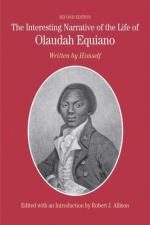together with gums of various kinds, and honey in abundance.
All our industry is exerted to improve those blessings
of nature. Agriculture is our chief employment;
and every one, even the children and women, are engaged
in it. Thus we are all habituated to labour from
our earliest years. Every one contributes something
to the common stock; and as we are unacquainted with
idleness, we have no beggars. The benefits of
such a mode of living are obvious. The West India
planters prefer the slaves of Benin or Eboe to those
of any other part of Guinea, for their hardiness,
intelligence, integrity, and zeal. Those benefits
are felt by us in the general healthiness of the people,
and in their vigour and activity; I might have added
too in their comeliness. Deformity is indeed
unknown amongst us, I mean that of shape. Numbers
of the natives of Eboe now in London might be brought
in support of this assertion: for, in regard to
complexion, ideas of beauty are wholly relative.
I remember while in Africa to have seen three negro
children, who were tawny, and another quite white,
who were universally regarded by myself, and the natives
in general, as far as related to their complexions,
as deformed. Our women too were in my eyes at
least uncommonly graceful, alert, and modest to a
degree of bashfulness; nor do I remember to have ever
heard of an instance of incontinence amongst them before
marriage. They are also remarkably cheerful.
Indeed cheerfulness and affability are two of the
leading characteristics of our nation.
Our tillage is exercised in a large plain or common,
some hours walk from our dwellings, and all the neighbours
resort thither in a body. They use no beasts
of husbandry; and their only instruments are hoes,
axes, shovels, and beaks, or pointed iron to dig with.
Sometimes we are visited by locusts, which come in
large clouds, so as to darken the air, and destroy
our harvest. This however happens rarely, but
when it does, a famine is produced by it. I remember
an instance or two wherein this happened. This
common is often the theatre of war; and therefore
when our people go out to till their land, they not
only go in a body, but generally take their arms with
them for fear of a surprise; and when they apprehend
an invasion they guard the avenues to their dwellings,
by driving sticks into the ground, which are so sharp
at one end as to pierce the foot, and are generally
dipt in poison. From what I can recollect of
these battles, they appear to have been irruptions
of one little state or district on the other, to obtain
prisoners or booty. Perhaps they were incited
to this by those traders who brought the European
goods I mentioned amongst us. Such a mode of
obtaining slaves in Africa is common; and I believe
more are procured this way, and by kidnapping, than
any other[E]. When a trader wants slaves, he
applies to a chief for them, and tempts him with his
wares. It is not extraordinary, if on this occasion
he yields to the temptation with as little firmness,




